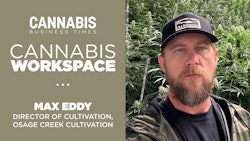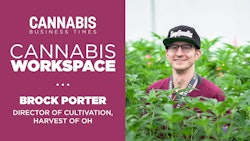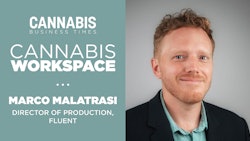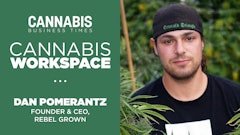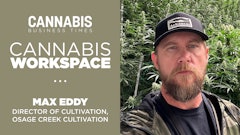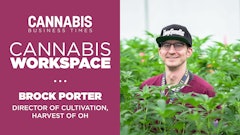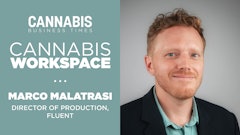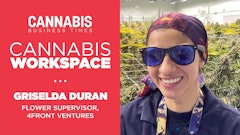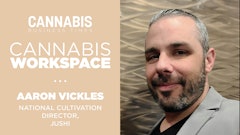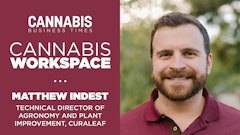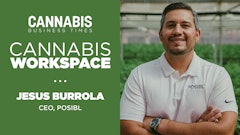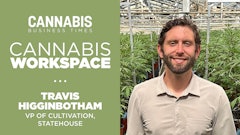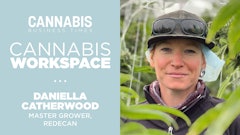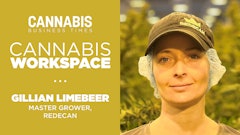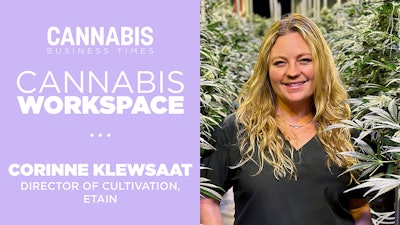
Name: Corinne Klewsaat
Title: Director of CultivationCompany: Etain Health
Location: Cultivation in Chestertown, N.Y.; four dispensaries throughout New York
One word to describe your cultivation style: Collaborative
Indoor, outdoor, greenhouse or a combination: Combination: climate-controlled greenhouse, indoor mother and clone room.
Q: Can you share a bit of your background and how you and your company got to the present day?
A: I first started in commercial agriculture at Rutgers University during my undergrade as the research farm manager. I studied environmental economics and food science, naturally falling into agroeconomics. I was part of a five-year study measuring yield and flexible pricing on organic versus conventional produce at farmer markets in different demographic locations. While the farm was winding down for the winter, a professor suggested I apply to a nearby medical cannabis grow operation that had recently opened. I fell in love with it; the plant, the people, the culture. It was a super exciting time in New Jersey; medical was just starting to pick up.
After graduation, I decided to see where the cannabis path would lead. I worked for that company for five years, helping start new grow operations in two neighboring states – Pennsylvania and Delaware. After multiple acquisitions and learning all I could with that company, I decided to see what else was out there in the cannabis world. I worked in hemp, selling clones to outdoor farmers, teaching classes in hemp fiber, seed (oil), and CBD whole flower. I joined a large-scale autoflower breeding program in a 500,000-square-foot greenhouse space. I worked in sales; designing and supplying new and old grow operations with everything from lighting map layouts and fixtures, irrigation systems, grow media, nutrients, tiered racking/benching, HVAC/airflow systems and controls. I learned a ton about infrastructure, policy, state regulations, barriers to entry, supply chain, the macro and microeconomics of regulated commercial cannabis and so much more.
When the opportunity to get back into the gardens was offered, I jumped on it. I joined Etain as the Director of Cultivation in June of 2022. Since then, we have more than tripled in cultivation canopy square footage in preparation for the NY adult use market.
Q: What tool or software in your cultivation space can you not live without?
A: Music and podcasts—Shaping Fire and Aroya Office Hours are my favorite cultivation podcasts/online hangouts; Ridder, our cultivation control system; and my Felco shears. I have had the same pair since 2016.
Q: What purchase of $100 or less has most positively impacted your business in the past six months?
A: New infrared temperature guns, which really get the full scope to calculate VPD [vapor pressure deficit]. Govee hygrometer/thermometer bluetooth sensors–they provide a great, quick reference. We have at least two in each area of cultivation and post-harvest.
Q: What cultivation technique are you most interested in right now, and what are you actively studying (the most)?
A: Crop steering in a greenhouse. I’ve explored this a bit in indoor settings, but growing in a greenhouse in Northern New York is a whole different situation. We have extremely cold, dry winters followed by hot, humid summers. We are currently collecting data to dial this in for each season, for each cultivar, and for each stage: vegetative and generative. I, specifically, am studying media substrates in conjunction with water content, EC, pH, dryback, watering event durations, run-off, transpiration rates and moisture retention.
Q: How has a failure, or apparent failure, set you up for later success? Do you have a “favorite failure” of yours?
A: One of my favorite sayings and words I live by are “smooth seas never made for a skilled sailor.” I have navigated some rough seas in my time in the cannabis industry, but I’m grateful I am able to use them as learning experiences to make me a better cultivator. One of my most memorable failures has taught me to always read the fine print when ordering equipment. Luckily it wasn’t a detrimental one. I had ordered new mobile benches that did not include the casters or trellis supports with the purchase and had to quickly adjust the budget and get them express shipped.
Q: What advice would you give to a smart, driven grower about to enter the legal, regulated industry? What advice should they ignore?
A: Network and always be willing to learn! Go to the events, meet people, take educational courses, get your name out there, talk to others, learn from experienced members of the industry. You never know who you may meet and where those connections may lead. While working as a cultivation tech a couple years back, I had a few people close to me say that this industry is not going to lead to a successful career, or ask when I was going to get a “real” job. It is different now, we have shown that there are legitimate careers in the cannabis industry. I’d say (and did) ignore those people, follow your passion and intuition and not the pressures of others/society.
Q: How do you deal with burnout?
A: Cultivation is a never-ending to do list; it can get overwhelming if not managed correctly. Ultimately, my work ethic and thought process is to enter and leave work knowing I did my absolute best with what I was given that day. That is all you really can do, there are only so many hours, tomorrow is a new day.
Q: How do you motivate your employees/team?
A: I like to involve employees as much as possible in the decision-making process and listen to their ideas. As someone who was in their shoes, it gives a sense of ownership, the feeling of being heard, and motivates one to care and take pride in their work or idea.
I like to also provide all the tools they need to succeed, if they have request, I almost never deny it—special shears, arm sleeves, a favorite pair of sunglasses, speakers for music, team paid lunch, etc.
Q: What keeps you awake at night?
A: All the little things that still need to be completed. I often keep a list written on the back of my hand in Sharpie for peace of mind; Post-it notes tend not to travel well.
Also, the sensor alarms. We are located in a less-than-ideal area for growing cannabis with a new build that needs fine tuning, but as we learn and troubleshoot the equipment and building, the less alarms we receive.
Q: What helps you sleep at night?
A: Knowing I did my best every day and gave it my all. Also, any Kush strain. OG Kush has always been my solid go-to.










